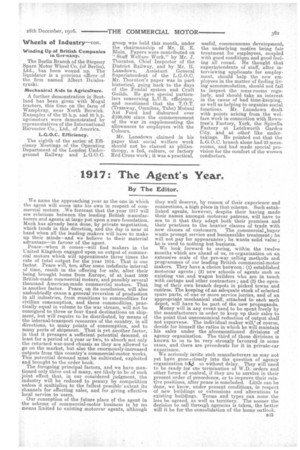1917: The Agent's Year.
Page 11

If you've noticed an error in this article please click here to report it so we can fix it.
By The Editor.
We name the approaching year as the one in which the agent will come into his own in respect of commercial motors. We forecast that the year 1917 will see relations between the leading British manufacturers and agents at large put upon a sure foundation. Much has already been done, by private negotiation, which tends in this direction, and the day is near at hand when all the leading makers will have to make up their minds—and we believe to their material advantage—in favour of the agent.
Peace—when it comes—will find makers in the United Kingdom engaged upon an output of commercial motors which will approximate three times the rate of total output for the year 1914. That is one factor. Peace will, too, after some indefinite interval of time, result in the offering for sale, after their being brought home from Europe, of at least 5000 British-made commercial motors, and possibly several thousand American-made commercial motors. That is another factor. Peace, on its conclusion, will also undoubtedly cause a general reversion of production in all industries, from munitions to commodities for civilian consumption, and these commodities, practically equal in volume to the war stream, will not be consigned to three or four fixed destinations on shipment, but will require to be distributed, by means of the internal-transport resources of the country, in all directions, to many points of consumption, and to many ports of shipment. That is yet another factor, in that it presages a sufficient potential demand, at least for a period of a year or two, to absorb not only the returned war-used chassis as they are allowed to go on the market, but also the enormously-increased outputs from this country's commercial-motor works. This potential demand must be Cultivated, exploited and brought to the order book.
The foregoing principal factors, and we have inentioned only three out of many, are likely to be of such joint effect that, in our considered judgment, the industry will be reduced to penury by competition unless it multiplies to the fullest possible' extent its channels for effecting sales, and for giving effective local service to users.
Our conception of the future place of the agent in the scheme of commercial-motor business is by no means limited to existing motorcar agents, although they well deserve, by reason of their experience and connections a high place in that scheme. Such established agents, however, despite their having made their names amongst motorcar patrons, will have to see to it that they adapt both their premises and their practices to the heavier classes of trade with new classes of customers. The .commercial buyer wants prompt service and businesslike treatment ; he will not pay for appearances ; he wants solid value ; he is used to nothing but business. We look forward to seeing, within the twelve months which are ahead of us, re-organization on an extensive scale of the pre-war selling methods and programmes of our leading British commercial-motor makers. They have a choice between : (1) established motorcar agents; (2) new schools of agents such as existing van, and wagon builders who are in touch with cartage and other contractors ; and (3) the opening of their own branch depots in picked towns and centres. The keeping of an adequate stock of selected spare parts, of one or more service lorries, and of an appropriate mechanical staff, attached to each such depot, will have to be part of the new propaganda. Money will in any event need to be spent freely by the manufacturers in order to keep up their sales to the point that uneconomical reduction of output shall not supervene. The individual maker of course, decide for himself the ratios in which he will maintain . his sales under the aforementioned divisions of agency organization. The third of those divisions is known to us to be very strongly favoured in some cases, and there are precedents for it in private-car experience. We seriously invite such manufacturers as may not yet have gone-closely into the question of agency organization tej,4 so without delay. They will need to be ready for he termination of W.D. orders and other forms of control, if they are to survive in their present order of precedence, or to improve their relative positions, after peace is concluded. Little can be done, we know, under present conditions, in respect of new buildings or extensions and alterations to existing buildings. Terms and types can none the less be agreed, as well as territory. The sooner the decision to sell through agencies is taken, the better will it be for the consolidation of the home outlook.




















